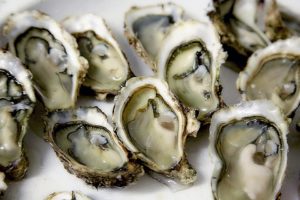 Oyster is the common name for a number of different families of salt-water bivalvemolluscs that live in marine or brackish habitats. In some species the valves are highly calcified, and many are somewhat irregular in shape. Many, but not all, oysters are in the superfamily Ostreoidea.
Oyster is the common name for a number of different families of salt-water bivalvemolluscs that live in marine or brackish habitats. In some species the valves are highly calcified, and many are somewhat irregular in shape. Many, but not all, oysters are in the superfamily Ostreoidea.
Contents
Uses
- Some kinds of oysters are commonly consumed by humans, cooked or raw, and are regarded as a delicacy. Some kinds of pearl oysters are harvested for the pearl produced within the mantle. Windowpane oysters are harvested for their translucent shells, which are used to make various kinds of decorative objects.
Benefits
-
Aphrodisiac
As an aphrodisiac, oysters can help boost sexual performance and libido, primarily in men. The zinc content of oysters is nearly unbelievable. They contain more than 1500% of the daily requirements of this essential mineral in a single serving. Zinc has also been closely linked to sexual dysfunction in men, while impotence and erectile dysfunction are closely associated with zinc deficiency. Therefore, eating them can give men their sexual edge back and increase feelings of masculinity.
-
Weight Loss
Oysters represent one of the most nutrient-packed foods with the lowest calories versus the volume of serving size. This means that people trying to lose weight can keep their body packed with the nutrients it needs, without adding too much weight. Compared to an equal serving size of a chicken, oysters have nearly half the calories, and chicken breasts are often turned to for low-calorie, protein-rich meals. Oysters are far superior in this respect, but it must be noted that they do have a high content of sodium. So for people already suffering from obesity, oysters may exacerbate the problem.
-
Protein Content
Proteins are an essential part of our diet, and oysters are a very strong source. Proteins are often broken down by the body’s enzymatic activity and then reconstructed into usable human proteins in every part of the body. This ensures proper metabolic activity, tissue repair, cellular growth, muscle strength, and a wide variety of necessary aspects of human health. The importance of protein in the diet cannot be overstated, and a single serving of oysters provides nearly 1/3 of the daily requirement.
Cautions
- Since they absorb much of the nutrients from the areas where they grow, it is possible that some oysters may contain pollutants and toxins, so only eat the ones that are bought from a trusted source. Furthermore, since the mineral content is so high in them, it is possible to suffer from signs of toxicity or mineral overdose, particularly of zinc, copper, selenium, vitamin B12, and vitamin D. Iron toxicity can result in hemochromatosis, which is a very dangerous condition. All things should be consumed in moderation, even vitamins and minerals, so keep your intake of oysters at a healthy, moderate level. Furthermore, the high sodium content can be dangerous for people already at high risk of heart disease or high blood pressure, so oysters should be used as preventive measures for heart conditions, rather than treatments
Interactions
- Not known.
Other names
- n/a
References
Source: Wikipedia, https://en.wikipedia.org/wiki/Oyster
OrganicFacts, https://www.organicfacts.net/health-benefits/animal-product/oysters.html
